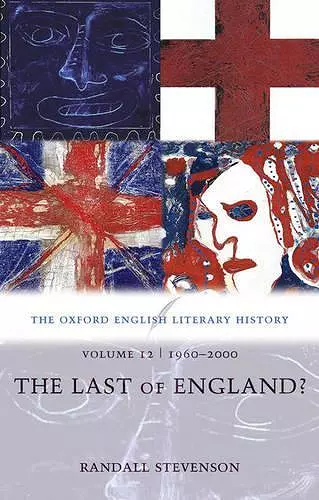The Oxford English Literary History: Volume 12: 1960-2000: The Last of England?
Format:Paperback
Publisher:Oxford University Press
Published:10th Nov '05
Currently unavailable, and unfortunately no date known when it will be back
This paperback is available in another edition too:
- Hardback£130.00(9780198184232)

English Literature in the 1960s soon threw off its post-war weariness and the tepid influences of the previous decade. New voices, new visions, and new commitments profoundly reshaped writing during the sixties, and throughout the rest of the century. Drama thrived on its rapidly rebuilt foundations. New freedoms of style and form revitalised fiction. Poetry, too, gradually recovered the variety and inventiveness of earlier years. As well as comprehensively charting these changes in the literary field, Randall Stevenson persuasively pinpoints their origins in the historical, social, and intellectual pressures of the times. Literary developments are revealingly related to the wider evolution and profound changes in English experience in the late twentieth century - to shadows of war and loss of empire; declining influences of class; shifting relations between the genders; emergent minority and counter-cultures; and the broadening democratization of contemporary life in general. Analyses of the rise of literary theory, of publishing and the book trade, and of the pervasive influences of modernism and postmodernism contribute further to an impressively thorough, insightful description of writing in the later twentieth century - a literary period Stevenson shows to be far more imaginative and exciting than has yet been recognized. Lucid, accessible, and engaging, this volume of the Oxford English Literary History presents a unique illumination of its age - one we have lived through, but are only just beginning to understand. The first full account of its period, it will set the agenda for discussion of late twentieth-century literature for many years to come.
For much of the period covered here the literature of England was dogged by an all-pervading sense of failure and decline. In Stevenson's analysis, a "misplaced nostalgia" impeded the progress of English drama, fiction and especially poetry. Philip Larkin mourned an "England gone", and he cast a long shadow over English verse. "English literature was never more static than under the influence of the Movement," says Stevenson. "If the later 20th century proved a difficult period for poetry, it was in large measure because it took so long to realise this, and move on." * Guardian *
English theatre fared better, raising issues of class (kitchen-sink drama) and sex, with Harold Pinter adding a dash of Beckettian absurdity; though its faltering progress is neatly summed up in the chapter title "Revolution, Television, Subsidy". As for the English novel, everyone was busy predicting its demise in the 1960s, but it was still going strong at the end of the century, with Salman Rushdie giving it a new multicultural spin. If this wise and fascinating survey has a single message, it is not to confuse change with loss. * Guardian *
- Winner of Saltire Society Research Book of the Year - Joint Winner 2004.
ISBN: 9780199288359
Dimensions: 217mm x 137mm x 32mm
Weight: 926g
644 pages